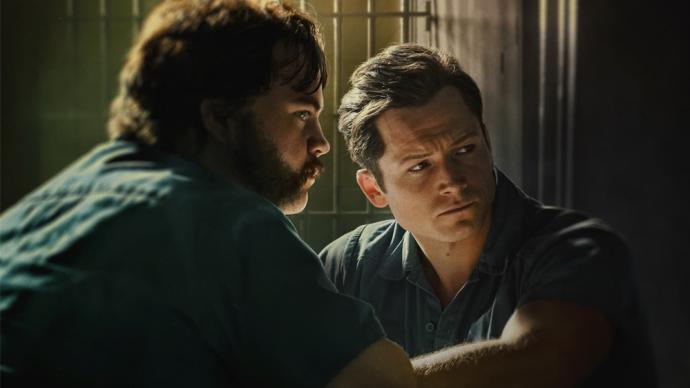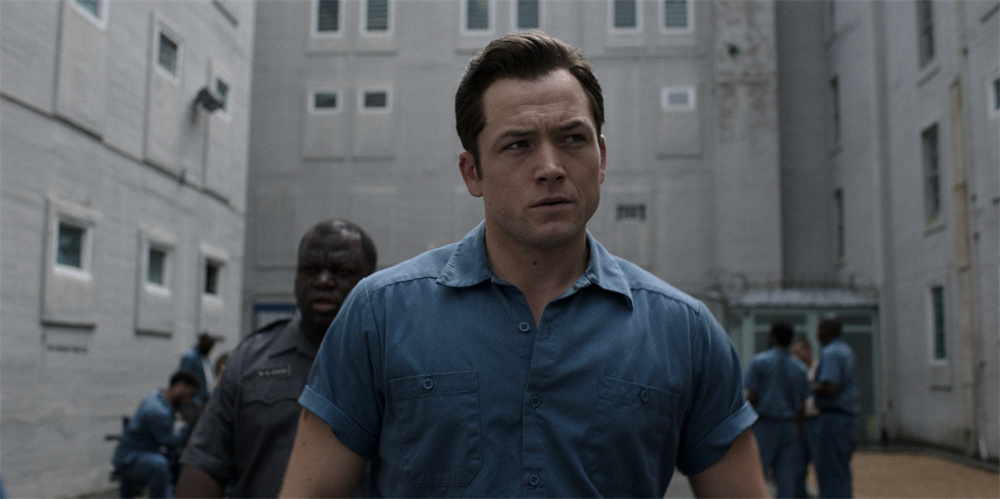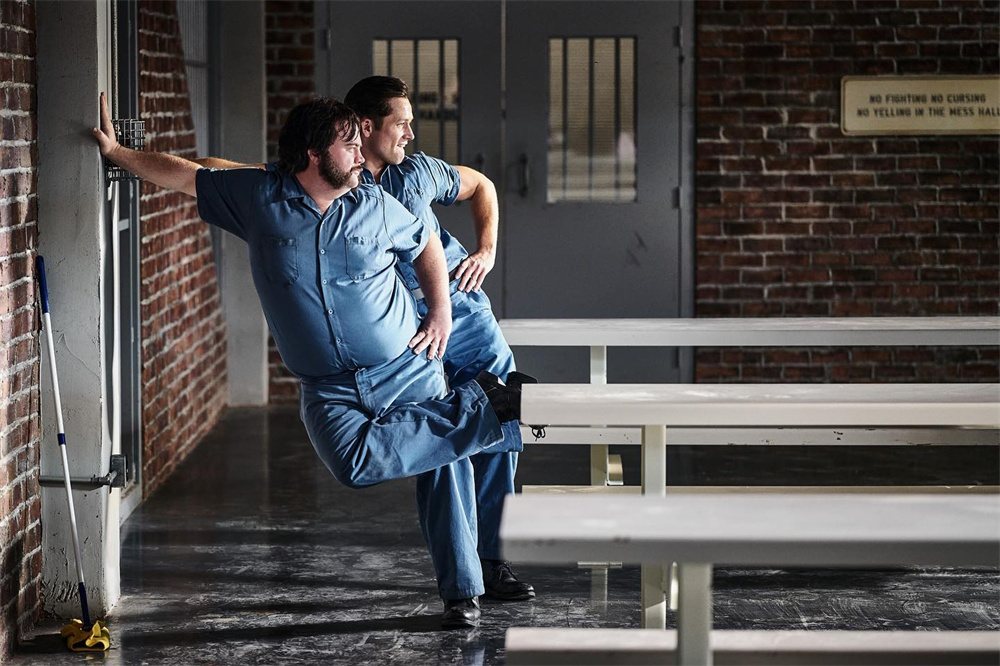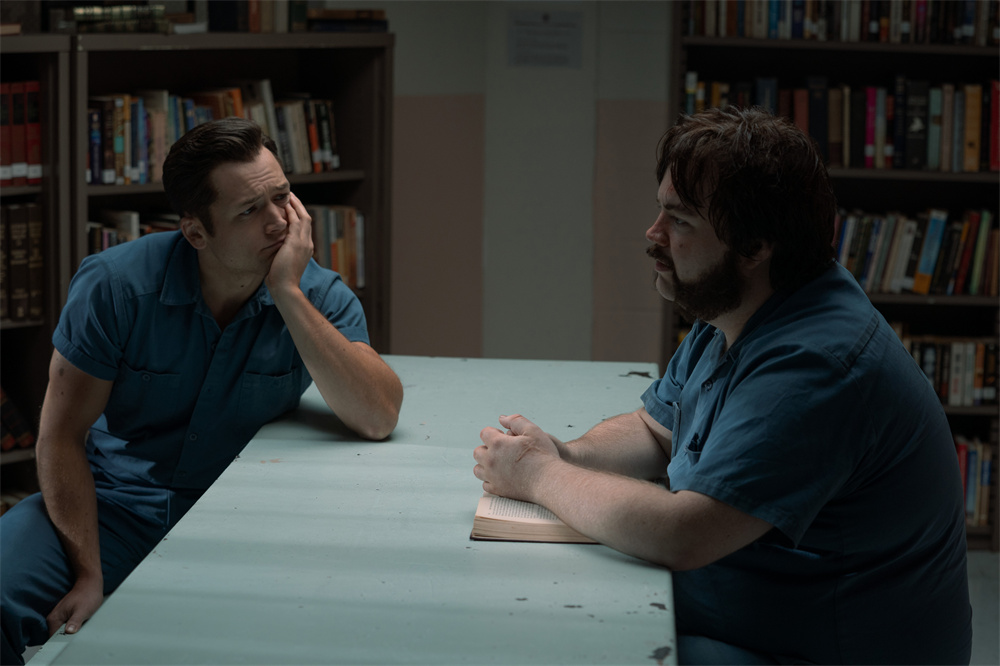
The heart of the question remains: where are the bodies?
Based on a true story, "Black Bird" (Black Bird) tells the audience: Larry (Paul Walter Hauser) is the murderer of the serial murder of a teenage girl. He has been thrown into prison, but most of the bodies have yet to be found. In order to ensure that Larry spends the rest of his life in prison, the detectives have come up with a more civilized grey solution than torture. FBI female agent Lauren (Sepid Moafe) finds a smart and arrogant drug dealer Jimmy (Taron Edgerton), changes his identity for him, and secretly transfers to Larry's felon. prison. Handsome and charismatic, Jimmy will play an undercover role. If Larry can figure out where the body was hidden, he will get an immediate reduction in his sentence, and the ten-year sentence will be written off.
Under the direct cold light of the prison, there is no longer a mysterious halo surrounding these people. It turns out that they also have ordinary faces, talk like ordinary people, and even have some ordinary people's emotions. So where is the problem, is it a mutation in the prefrontal lobe, or is it a childhood misfortune? Questions with no definite answer are most fascinating. When someone staring into the abyss goes through an emotional breakdown in place of the audience, it's a big shock to us.
Larry was horrible, his horror was hard to describe. The person he talks to, Jimmy, is not a professional, just a criminal eager to make a living. They gradually formed a friendship in prison. The night after Jimmy heard Larry calmly describe the killing, he fought back tears and prayed at the head of his bed, not immune to the path of those staring into the abyss.
In the case of the case itself, Blackbird could well be a chapter in Mindhunter. Now it's a six-episode miniseries for Apple TV. There are about two reasons why this case could stand alone, assuming that the audience who would choose the show was already fairly familiar with Criminal Minds.
First, because the two protagonists Larry and Jimmy have an equal relationship in prison, which is different from other works. Although Jimmy's purpose is also to obtain information, he must act undercover as Larry's comrade. In a felon prison with an explosive atmosphere and an extremely depressing atmosphere, as the rare marginalized people who do not join the gang to protect themselves, they have indeed formed a friendship. This unique friendship is worth writing about.
Second, both Larry and Jimmy have the temperament of minors. The prison environment is complex and simple, much like a school. These two people, one obsessed with the re-enactment of the American Civil War, antique cars and teenage girls, and the other a successful drug dealer with long sleeves and good dance, have not yet escaped the protection of the black police father, often indulging in the high school time of playing football and being a heartthrob.
The story takes place in the 1990s, in the American South covered by fields. American boy Jimmy and American weird boy Larry, two people who don't usually meet, meet in prison.
At the beginning, Jimmy came on stage with such a stereotype, and was proud of his male friends, claiming that he was "worth a million with a smile". Actor Taron Edgerton's large muscles seem to be glued on, and his gait is slightly stiff, like a Transformers going to prison.
He was deprived of his liberty, not deprived of his charm. In prison, the two became friends after courting Larry several times. Because of Jimmy's Italian origin and his humble response, he was quickly taken care of by the Italian boss in prison, and he fought for the right to "survive independently" without being in trouble without joining the mountain. At the beginning of prison life, everything was easy and continued the trajectory of his past life. Heartthrob Jimmy only needs to cast his glamour and bow his head a little (but not lose his ego) and you'll be fine.
Prison depths. Larry represents the innocence and evil in the depths of human nature. A little advice from the gangster who didn't make many appearances made Jimmy understand how frivolous he was in the past. The old father was very sad because his son was in prison. After a stroke, he insisted on moving to a motel next to the prison. "I will protect you from a wall." But Lian Po is old, and he can no longer protect his son. He loses the strength and energy of the old policeman, and his mind becomes confused. In the end, only love is left. Jimmy's cry at the end of episode 5 as he prays, not only because of seeing the abyss. The black prison guard cut off his contact with the outside world. He couldn't call his father. He cried like he couldn't wait for his father to come back when he was a child.
Larry's way of speaking bears traces of a child. He speaks very slowly and in a brittle voice, pausing from time to time to take a breath and twitch his lips. Police and psychologists have defined Larry as a personality defect that needs extreme attention. The basis is that he turned himself in, directed the police to drive back and forth on the body throwing route, and played the police round and round for fun.
But Larry's personality is more than "needs attention". His adult body is full of the characteristics of children of different ages. Larry has obsessive hobbies (vintage cars), prides himself on what he's good at (is a great cleaner), develops friendships (with his brother and Jimmy), and can read people's minds. Larry loves girls and justifies his "preference" with the old days when girls can be brides at twelve or thirteen. The real reason may be that his mind is still at the age of twelve or thirteen. Of course, teenage boys like girls of the same age, but his body has grown into a terrifying adult fat man. Traits that are accepted in children and adolescents can be weird in adults. The girls were always friendly to him at first, treating him as a somewhat eccentric adult, similar to today's deep otaku. After discovering that was not the case, they just wanted to avoid him.
Not only does Larry have the obsessive way a teenager loves a thing/person, but also the cruelty and stubbornness of a toddler. Ordinary people will get rid of this cruelty and stubbornness in the process of socialization, and use morality to adapt themselves to society, or at least hide it. Children cry hard when they can't get it. Before morality is established, they sometimes rob or destroy the treasures they cannot get, without feeling guilt or pity.
So does Larry. He slowly confided to Jimmy the process of killing a little girl, without remorse or intolerance, just like a child who doesn't know what life is, so he can kill other small animals without hesitation. Children always kill creatures that are much weaker than them and won't fight back. It's human instinct, and so does Larry. He eats his pet dog and kills little girls like a child. A child who is too young does not yet know what life is, and he does not know how to cherish his own life, let alone that of others.
If Larry is a child and Jimmy is a teenager, the detectives on the show are fully grown. Jimmy is still able to get to know Larry through contact, which is almost impossible for the detectives. It was incomprehensible that they had misplaced Larry. There was a cop who grew up in the same town as Larry and insisted that Larry was just an innocent weirdo who would never hurt anyone. They never imagined that a large part of Larry's heart was a young child who did not understand life and death.
Looking at Larry from this angle, he would have pity on him. Thinking that he would definitely be "betrayed" by Jimmy and losing this proud friend of his would be unbearable. The self-report of the victim girl allows us to see the other side of the story, to see what a terrible monster this fat man Larry, who is as soft as a child, is.
But in reality, one emotion does not cancel out the other. Sympathy for the victim, and the complex emotions that Larry's character inspires, his apology for his broken friendship and his return to loneliness, can coexist. This kind of taste makes up for some of the shortcomings of "Black Bird", such as the blandness of the police detective's field corpse line, the stereotyped portrayal of the prison environment, and the frame-hopping mood changes of Taron Edgerton. Poor acting, etc.
If you are curious about the cruel child psychology on the pervert killer, this show is still a good sample.
Based on a true story, "Black Bird" (Black Bird) tells the audience: Larry (Paul Walter Hauser) is the murderer of the serial murder of a teenage girl. He has been thrown into prison, but most of the bodies have yet to be found. In order to ensure that Larry spends the rest of his life in prison, the detectives have come up with a more civilized grey solution than torture. FBI female agent Lauren (Sepid Moafe) finds a smart and arrogant drug dealer Jimmy (Taron Edgerton), changes his identity for him, and secretly transfers to Larry's felon. prison. Handsome and charismatic, Jimmy will play an undercover role. If Larry can figure out where the body was hidden, he will get an immediate reduction in his sentence, and the ten-year sentence will be written off.

"Blackbird" poster
Talking to a serial killer and exposing the perverted psychology in the dialogue can easily be overrated as long as the filming is not bad. Compared to the process of killing and chasing murderers, audiences now seem to prefer watching serial killers behind bars. Having someone else (usually an expert on criminal psychology) look into the criminal's eyes instead of him allows the audience to keep a safe distance. The creepy narration of the perverted killers, the sudden movements, the unpredictable changes in expression, and the reassuring presence of one (or several) more powerful than the audience. We need this layer of buffer, because in the performance of film and television dramas, serial killers who have lost their freedom and hope and suppressed their desires are more terrifying than they were when they committed crimes.Under the direct cold light of the prison, there is no longer a mysterious halo surrounding these people. It turns out that they also have ordinary faces, talk like ordinary people, and even have some ordinary people's emotions. So where is the problem, is it a mutation in the prefrontal lobe, or is it a childhood misfortune? Questions with no definite answer are most fascinating. When someone staring into the abyss goes through an emotional breakdown in place of the audience, it's a big shock to us.
Larry was horrible, his horror was hard to describe. The person he talks to, Jimmy, is not a professional, just a criminal eager to make a living. They gradually formed a friendship in prison. The night after Jimmy heard Larry calmly describe the killing, he fought back tears and prayed at the head of his bed, not immune to the path of those staring into the abyss.
In the case of the case itself, Blackbird could well be a chapter in Mindhunter. Now it's a six-episode miniseries for Apple TV. There are about two reasons why this case could stand alone, assuming that the audience who would choose the show was already fairly familiar with Criminal Minds.
First, because the two protagonists Larry and Jimmy have an equal relationship in prison, which is different from other works. Although Jimmy's purpose is also to obtain information, he must act undercover as Larry's comrade. In a felon prison with an explosive atmosphere and an extremely depressing atmosphere, as the rare marginalized people who do not join the gang to protect themselves, they have indeed formed a friendship. This unique friendship is worth writing about.
Second, both Larry and Jimmy have the temperament of minors. The prison environment is complex and simple, much like a school. These two people, one obsessed with the re-enactment of the American Civil War, antique cars and teenage girls, and the other a successful drug dealer with long sleeves and good dance, have not yet escaped the protection of the black police father, often indulging in the high school time of playing football and being a heartthrob.
The story takes place in the 1990s, in the American South covered by fields. American boy Jimmy and American weird boy Larry, two people who don't usually meet, meet in prison.

"Blackbird" stills
The character Jimmy shares a portrait with Steve (Joe Keery) from Stranger Things. Both of them were the most popular boys in the United States at that time. One played rugby and the other played basketball. They were sunny and athletic, born with leadership qualities, conceited but moral, not afraid of the strong, and not bullying the weak. The disadvantage is that the brain is relatively simple, and it is a bit lacking in imagination, thinking, and knowledge reserves. Their female counterparts are cheerleaders and small-town beauty queens. The lovable, energetic blondes of the 1990s tended to be brainless, narrow-minded and acerbic decades later.At the beginning, Jimmy came on stage with such a stereotype, and was proud of his male friends, claiming that he was "worth a million with a smile". Actor Taron Edgerton's large muscles seem to be glued on, and his gait is slightly stiff, like a Transformers going to prison.
He was deprived of his liberty, not deprived of his charm. In prison, the two became friends after courting Larry several times. Because of Jimmy's Italian origin and his humble response, he was quickly taken care of by the Italian boss in prison, and he fought for the right to "survive independently" without being in trouble without joining the mountain. At the beginning of prison life, everything was easy and continued the trajectory of his past life. Heartthrob Jimmy only needs to cast his glamour and bow his head a little (but not lose his ego) and you'll be fine.

"Blackbird" stills
In fact, "Blackbird" is more like the growth history of the silly white sweet American boy Jimmy. Whether it's Larry, the gangster, or his old father, they're all teaching him how to be a man. Jimmy later found out that the charm wasn't enough to get him out of here alive. His former life sounded majestic, football, women, drug dealing, and wealth squandering were all superficial.Prison depths. Larry represents the innocence and evil in the depths of human nature. A little advice from the gangster who didn't make many appearances made Jimmy understand how frivolous he was in the past. The old father was very sad because his son was in prison. After a stroke, he insisted on moving to a motel next to the prison. "I will protect you from a wall." But Lian Po is old, and he can no longer protect his son. He loses the strength and energy of the old policeman, and his mind becomes confused. In the end, only love is left. Jimmy's cry at the end of episode 5 as he prays, not only because of seeing the abyss. The black prison guard cut off his contact with the outside world. He couldn't call his father. He cried like he couldn't wait for his father to come back when he was a child.

"Blackbird" stills
Of Jimmy's "Growing Up Prisons," partner/opponent Larry is one of the hardest to see. He approached Larry with a mission to use him to accomplish the goal of reducing his sentence. In his first appearance, Paul Walter Hauser portrayed his role as Larry as a pig eating a tiger. Larry was obese, had leaky front teeth, had a slight rosacea, and wore the sideburns of a Confederate general during the American Civil War, claiming that all his disadvantages were due to his identical twin brother "sucking my blood" as a fetus.Larry's way of speaking bears traces of a child. He speaks very slowly and in a brittle voice, pausing from time to time to take a breath and twitch his lips. Police and psychologists have defined Larry as a personality defect that needs extreme attention. The basis is that he turned himself in, directed the police to drive back and forth on the body throwing route, and played the police round and round for fun.
But Larry's personality is more than "needs attention". His adult body is full of the characteristics of children of different ages. Larry has obsessive hobbies (vintage cars), prides himself on what he's good at (is a great cleaner), develops friendships (with his brother and Jimmy), and can read people's minds. Larry loves girls and justifies his "preference" with the old days when girls can be brides at twelve or thirteen. The real reason may be that his mind is still at the age of twelve or thirteen. Of course, teenage boys like girls of the same age, but his body has grown into a terrifying adult fat man. Traits that are accepted in children and adolescents can be weird in adults. The girls were always friendly to him at first, treating him as a somewhat eccentric adult, similar to today's deep otaku. After discovering that was not the case, they just wanted to avoid him.
Not only does Larry have the obsessive way a teenager loves a thing/person, but also the cruelty and stubbornness of a toddler. Ordinary people will get rid of this cruelty and stubbornness in the process of socialization, and use morality to adapt themselves to society, or at least hide it. Children cry hard when they can't get it. Before morality is established, they sometimes rob or destroy the treasures they cannot get, without feeling guilt or pity.
So does Larry. He slowly confided to Jimmy the process of killing a little girl, without remorse or intolerance, just like a child who doesn't know what life is, so he can kill other small animals without hesitation. Children always kill creatures that are much weaker than them and won't fight back. It's human instinct, and so does Larry. He eats his pet dog and kills little girls like a child. A child who is too young does not yet know what life is, and he does not know how to cherish his own life, let alone that of others.

"Blackbird" stills
During Jimmy and Larry's conversations, Jimmy would often ask Larry "why". Why do you do this, and why do you think that way? Larry's blue eyes, immersed in the story, suddenly widened and asked Jimmy, "Why are you asking?" At first, like Jimmy, I felt that this was Larry's vigilance and threat. He sensed that Jimmy had too many problems, and worried that he might be an undercover agent who wanted to spy on the secret (where the body was). Later, I found out that Larry may be really puzzled by this question. He regards Jimmy as a "same age" friend of his own mind, and tacitly acquiesces that Jimmy fully understands his various child psychology.If Larry is a child and Jimmy is a teenager, the detectives on the show are fully grown. Jimmy is still able to get to know Larry through contact, which is almost impossible for the detectives. It was incomprehensible that they had misplaced Larry. There was a cop who grew up in the same town as Larry and insisted that Larry was just an innocent weirdo who would never hurt anyone. They never imagined that a large part of Larry's heart was a young child who did not understand life and death.
Looking at Larry from this angle, he would have pity on him. Thinking that he would definitely be "betrayed" by Jimmy and losing this proud friend of his would be unbearable. The self-report of the victim girl allows us to see the other side of the story, to see what a terrible monster this fat man Larry, who is as soft as a child, is.
But in reality, one emotion does not cancel out the other. Sympathy for the victim, and the complex emotions that Larry's character inspires, his apology for his broken friendship and his return to loneliness, can coexist. This kind of taste makes up for some of the shortcomings of "Black Bird", such as the blandness of the police detective's field corpse line, the stereotyped portrayal of the prison environment, and the frame-hopping mood changes of Taron Edgerton. Poor acting, etc.
If you are curious about the cruel child psychology on the pervert killer, this show is still a good sample.
Related Posts